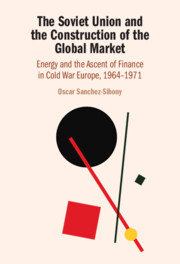 The Soviet Union and the Construction of the Global Market
The Soviet Union and the Construction of the Global Market The Travails of Institutionalization
Published online by Cambridge University Press: 31 August 2023
France offers a contrast to the ways in which finance and energy, and by extension economic life, was governed elsewhere in Europe. The French state, as keen as the Soviets to develop material exchanges beyond the hegemony of American stricture, sought to institutionalize these exchanges through a series of committees and working groups that would govern talks and practices. This was successful to a degree. But despite pressure from the Soviets to liberalize French trade and finance, the French state did not consider it urgent to get a hold of Soviet energy. Instituting working groups in the second half of the 1960s that would meet regularly to discuss trade and finance had been fruitful for the Soviets at the height of Bretton Woods and the technologies it purveyed, such as trade lists and long-term trade agreements. They were still, in many ways, the backbone of the economic relations the Soviet Union maintained with its Western neighbors. What they were not, however, was the future the Soviets envisaged. In Franco-Soviet relations, it was the Soviets that insistently pushed the temporal and material limits. And the French, reluctantly, followed.
To save this book to your Kindle, first ensure no-reply@cambridge.org is added to your Approved Personal Document E-mail List under your Personal Document Settings on the Manage Your Content and Devices page of your Amazon account. Then enter the ‘name’ part of your Kindle email address below. Find out more about saving to your Kindle.
Note you can select to save to either the @free.kindle.com or @kindle.com variations. ‘@free.kindle.com’ emails are free but can only be saved to your device when it is connected to wi-fi. ‘@kindle.com’ emails can be delivered even when you are not connected to wi-fi, but note that service fees apply.
Find out more about the Kindle Personal Document Service.
To save content items to your account, please confirm that you agree to abide by our usage policies. If this is the first time you use this feature, you will be asked to authorise Cambridge Core to connect with your account. Find out more about saving content to Dropbox.
To save content items to your account, please confirm that you agree to abide by our usage policies. If this is the first time you use this feature, you will be asked to authorise Cambridge Core to connect with your account. Find out more about saving content to Google Drive.